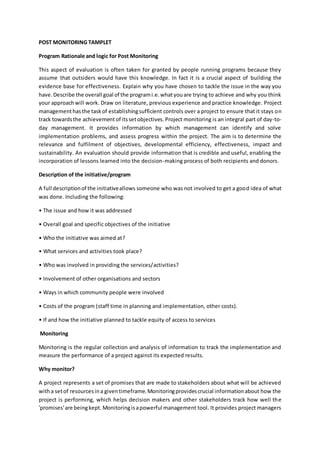
Program Rationale and Logic for Post Monitoring
- 1. POST MONITORING TAMPLET Program Rationale and logic for Post Monitoring This aspect of evaluation is often taken for granted by people running programs because they assume that outsiders would have this knowledge. In fact it is a crucial aspect of building the evidence base for effectiveness. Explain why you have chosen to tackle the issue in the way you have.Describe the overall goal of the programi.e.whatyouare trying to achieve and why you think your approachwill work. Draw on literature, previous experience and practice knowledge. Project managementhas the taskof establishingsufficient controls over a project to ensure that it stays on track towardsthe achievement of itssetobjectives. Project monitoring is an integral part of day-to- day management. It provides information by which management can identify and solve implementation problems, and assess progress within the project. The aim is to determine the relevance and fulfilment of objectives, developmental efficiency, effectiveness, impact and sustainability. An evaluation should provide information that is credible and useful, enabling the incorporation of lessons learned into the decision-making process of both recipients and donors. Description of the initiative/program A full descriptionof the initiativeallows someone who was not involved to get a good idea of what was done. Including the following: • The issue and how it was addressed • Overall goal and specific objectives of the initiative • Who the initiative was aimed at? • What services and activities took place? • Who was involved in providing the services/activities? • Involvement of other organisations and sectors • Ways in which community people were involved • Costs of the program (staff time in planning and implementation, other costs). • If and how the initiative planned to tackle equity of access to services Monitoring Monitoring is the regular collection and analysis of information to track the implementation and measure the performance of a project against its expected results. Why monitor? A project represents a set of promises that are made to stakeholders about what will be achieved witha setof resourcesina giventimeframe.Monitoringprovidescrucial informationabout how the project is performing, which helps decision makers and other stakeholders track how well the 'promises'are beingkept. Monitoringisapowerful management tool. It provides project managers
- 2. withinformationtotrackimplementation,sothattheycan identifywhateverobstaclesare impeding the project's success as early as possible. It is a source of information for justifying changes in managementstrategy, budgets, etc., otherwise known as adaptive management. When it is used well,monitoringalsohelps to identify promising interventions early on which could be replicated. Monitoring is also a tool for motivating the stakeholders, by generating a shared understanding of the projectand itscontexts.The informationthatitprovidescanpromote accountability, credibility and public confidence in the project. In this instance implementation is seen as a continuous learning process where experience gathered is analysed and fed back into planning and updated implementation approaches. What is participatory evaluation? Participatory evaluation seeks to engage key project stakeholders more actively in reflecting ans assessingthe progressof theirprojectandin particular the achievement of results as well as taking joint action out of evaluation findings. Any evaluation seeks to assess issues of effectiveness, efficiency,impact,relevance andsustainabilityof the developmentintervention. These five aspects are at timesreferredtoasevaluationcriteria. The table below is gives specific questions which the five monitoring aspects seek to answer. Table 1: Specific Issues covered by Evaluations Evaluation Aspect What are we going to do? 1. Efficiency - To what degree did the outputs (services and products) result from efficient use of financial, human and material resources? - How do outputs compare with outputs? How best were activitiesundertakenandcouldithave been done better, more cheaply and more quickly? 2. Effectiveness - To what extenthave objectivesbeen achieved? Were activities sufficient to achieve agreed objectives? 3. Relevance - Were the implemented activities in line with organisational mandate or purpose of existence? - Were the activitiesin line with primary stakeholders’ priorities and needs? - Should the project be changed, continued or terminated? 4. Sustainability - What are the chances that benefits/activities will continue, if the project/ programme stopped supporting certain interventions? - Are beneficiariesable toaccessservicesontheirowninabsence of the organisation or intervention? - To what extentare resultantchangesamongdutybearers going to last? - How financiallysustainableis the organisation or intervention? - Can the intervention be replicated elsewhere? 5. Impact - What have been the intended and unintended positive and negative aspects of implementing intervention?
- 3. Evaluation differs from monitoring in three respects: Timing, Focus and Level of Detail Monitoring and evaluations are interactive and mutually supportive processes. Monitoring and evaluation of development activities therefore provides government officials, development managers,andcivil societywithbettermeansfor learning from past experience, improving service delivery, planning and allocating resources, and demonstrating results as part of accountability to key stakeholders. In orderto fullyunderstandthe role of monitoringindevelopmentprojects,some revisionof project planning and management is necessary.